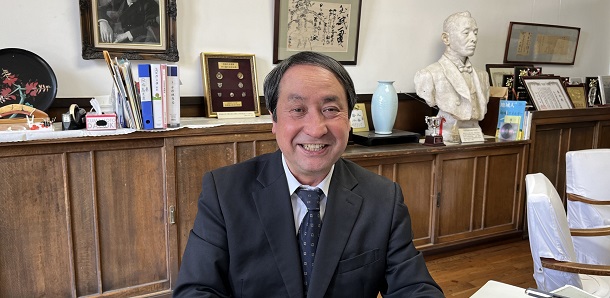第170号 探究の時間が面白い(2年生)
【総合的な探究の時間が面白い(2年生)】
「総合的な学習の時間」は、平成 11 年(1999年)創設されたものですが、平成21年(2009年)告示の現在の学習指導要領においては、その目標を
「横断的・総合的な学習や探究的な学習を通じて、自ら課題を見付け、自ら学び、自ら考え、主体的に判断し、よりよく問題を解決する資質や能力を育成するとともに、学び方やものの考え方を身に付け、問題の解決や探究活動に主体的、創造的、協同的に取り組む態度を育て、自己の在り方生き方を考えることができるようにする。」と定めています。
一方、新学習指導要領(平成30年(2018年)告示)では、「総合的な探究の時間」と学習から探究へと表現を変え、その目標も、探究の見方・考え方を働かせ、自己の在り方生き方を考えながら、よりよく課題を発見し解決していくための資質・能力を育成することを明確化しています。(新学習指導要領の記載は、このページの最下部で見られます。)
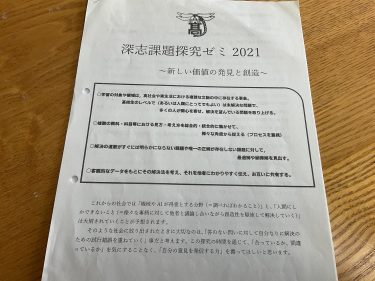
2年生になった本年度は、再び個人個人が「問い」を設定し、「仮説」に基づいた調査等を行う、探究活動が始まっています。昨年度の問いをベースに、さらに発展させたり新たな角度から継続してテーマ設定をすることを基本にしています。
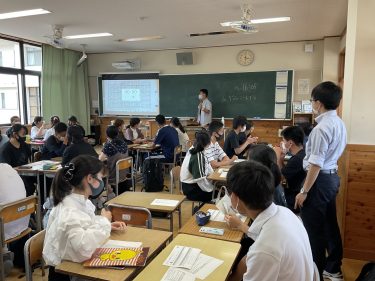
今日の授業では、自身の課題設定を深めるため、グループ内でそれぞれがプレゼンをした後でディスカッションを行いました。学年全体からランダムに選ばれた4人グループのため、当然これまであまり話したことのない人とも一緒に活動します。
自身の「問い」について語る時間、友達が感想を述べたりアドバイス等をする時間を通して、それぞれの「問い」が深まっていく様子がわかります。
個人探究ではありますが、協働的にお互いの学びを深めている姿、「課題発見」の時点で他者の意見を聞き自己調整していく姿、この2点が上手に行われていると感じました。上記の目標にある通り、よりよく課題を発見し、解決していく学びに加えて、創造的、協働的に取り組む態度が育っていることがうかがえます。
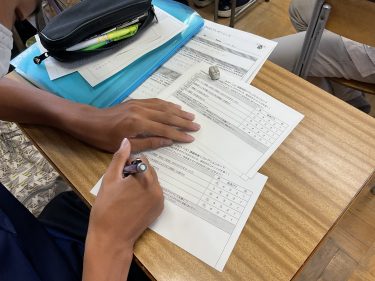
2年生の岩間光太郎君は、こうした活動について次のように話します。
「昨年度の当初はいやいや始めた活動で、探究をガチでやるとは思っていませんでした。木材を残さず利用するため、おが屑からどれだけ発電できるか、を考えて廃棄木材の量やバイオマス発電の発電量などを調べ始めましたが、やっていくうちに、これも調べたい、これはどうなっているんだろうと、問いが次から次へと出てきました。
2年生になった今は林業の危機をどう乗り越えていったらいいかを考えていて、今年は木を切り出す現場に出かけていくつもりです。中学時代には人と違う山野草や鉄道が好きだった自分が、高校に入って何が本当に好きなんだろうと探す学びの中で、「林業」に出会えたことが一番の幸せです。大学へ行っても林業の研究を続けたいです。」
昨年度から探究活動の取り組みを進める中心となってきた大林慎太郎先生(英語科・2年担任)はこうした生徒の活動について、次のように話しています。
「未だ世の中で答えの出ていない、自ら興味を持ったテーマや仮説に対し、どのように検証を行い、説得力のある結果を導けば良いのか。その過程の中で、日頃学んでいる教科学習の重要性と、その学習が世の中や自分の将来と繋がっていることを実感してほしい。
今年度は、校内の生徒や教員とだけでなく、外の世界の人々との繋がりをもったり、まちなかの人々にも取り組みを発信し、タテヨコのコミュニティから一歩踏み出し、ナナメの人間関係を生み出し、自分と社会との繋がりを体験して欲しい。」
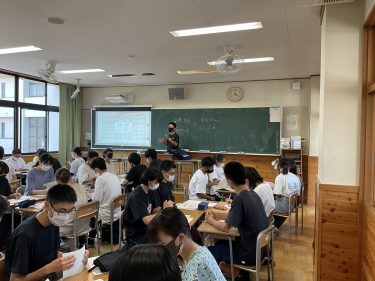
今後、それぞれの探究活動が進み、深まっていくことを期待しています。
(English version)
The Ministry of Education, Culture, Sports, Science and Technology (short for MEXT) refers to the integrated (comprehensive) learning hours as “Period for Inquiry-Based Cross-Disciplinary Study.”
The original lesson objective is mainly to enable students to think about life and their own tasks through cross-synthetic studies and inquiry studies, to learn and think on their own, to make proactive decisions, and to solve problems better, in an independent, creative and cooperative manner.
Last year all the first-year students set their own theme of inquiry, made a hypothetical investigation, and finalized their projects in a video form for up to 10 minutes, so that everyone at school could see them anytime on their device.
This year they again started their own inquiry project based on their past study. Today, I watched a lesson where groups of four random students were made and started a session for a presentation and discussion concerning the projects in each group.
I could sense that through the group discussion each member was deepening their own inquiry and research process and planning, which could be partly referred to as a cooperative activity.
One of the students named Mr. IWAMA Kotaro, says,
“I didn’t think I would do the research project so intensely at the beginning, but as the investigation about my own theme of wood consumption in Nagano went on, I came upon a new question after another, which made me more interested in the research work.
This year I would like to research the crisis of the wood industry, by actually going to where relevant jobs are being done. I am happy that I have come across the lifelong theme of my interest. I would like to continue my study after I go to a higher education.”
Mr. OBAYASHI Shintaro, an English teacher in charge of the lesson, comments,
“I want the students to think of how convincingly they try to answer to the yet-to-be-solved problems of their own interest in the world, setting their hypothesis to the problem. In the process of their investigation I want them to realize the importance of the general subjects they study every day at school, which have to do with their future career and the world around them.
This year I want the students to communicate not only with those inside school but with those outside during their research, and also to let the community know what they are doing, which eventually enables them to experience a multi-layer communication with the people in the society.”
I hope all the students will be heading for the better.


